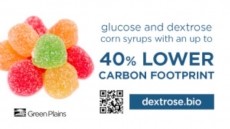'Nextgen sweetener': Meringue kisses hold reduced sugar chocolate potential
The Israeli company introduced sweetener Liteez – made from prebiotic fibers and vegetable proteins - at trade fair ISM in Cologne in February.
Liteez can be a sweetener for hot drinks or a standalone confection. Lampados touts it as a 'nextgen sweetener' on its website.
Liteez as an inclusion
The company will soon release a non-water-soluble version, intended as a food ingredient.

“It can go inside ice creams, chocolate bars or in chocolate chip cookies,” said Noam Kaplan, CEO of Lampados. “Instead of chocolate chips, you use our meringue cookies.
“A lot of companies struggle with sugar reduction. Some use stevia instead of sugar, but if they want to use additives such as meringue kisses or chocolate chips inside, they struggle with sugar reduction.”
Liteez as a confection and sweetener
Dissolvable Liteez is a vegan and non-GMO product aimed at the private label market as a sweetener for tea or coffee.
“It’s a dual purpose. You can also eat it just like a regular meringue,” said Kaplan.
The plant-based snack contains only six ingredients. Two kisses contain two calories, compared to 20 calories in one teaspoon of table sugar.
Flavor NPD coming soon
Lampados intends to target the US and Europe, but found wider appeal at ISM.
“We found a major interest from the Far East, from Malaysia, Japan and South Korea,” said Kaplan.
“The obesity over there is rising and they are looking for solutions for people to sweeten, and mainly as confectionery.”
Liteez is considered ‘natural’ in most EU markets, according to Kaplan. However, it cannot be labeled as such in Israel and Canada, where regulations are stricter, he said.
Lamapdos plans to introduce different flavors of its kisses, such as Irish cream for coffee drinkers, and lemon and orange variants for tea consumers.
It says it can produce flavors on request, giving manufacturers the possibility to create sugar-free flavor trends.
Family-owned tabletop sweetener firm Lampados was founded in Israel by Menny Kaplan in 1975. Noam Kaplan joined the company as CEO in 2009.




















